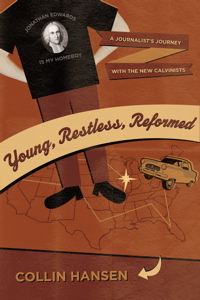 Time magazine has just declared the New Calvinism one of the 10 Ideas Changing The World, and so it is worth our while to read Collin Hansen’s journalistic endeavor to understand and report upon this New Calvinism. In, Young, Restless, and Reformed, Hansen writes of his journey across America investigating the current resurgence of Calvinistic and Reformed soteriology. This journey was prompted by his own conversion as an evangelical to this New Calvinism and he desired to know if his experience was unique, and if not, what was leading the charge to drive others to reformed theology.
Time magazine has just declared the New Calvinism one of the 10 Ideas Changing The World, and so it is worth our while to read Collin Hansen’s journalistic endeavor to understand and report upon this New Calvinism. In, Young, Restless, and Reformed, Hansen writes of his journey across America investigating the current resurgence of Calvinistic and Reformed soteriology. This journey was prompted by his own conversion as an evangelical to this New Calvinism and he desired to know if his experience was unique, and if not, what was leading the charge to drive others to reformed theology.
He soon discovered that the resurgence of reformed theology was far reaching, and found many reasons as to why this might be the case. Timothy George of Beeson Divinity School put it this way:
We live in a transcendence-starved culture anda transcendence-starved evangelicalism. We’ve so dumbed down the gospel and dumbed down worship in a good effort to reach as many people as we can that there’s almost a backlash. It comes from this great hunger for a genuinely God-centered, transcendence-focused understanding of who God is and what God wants us to do and what God has given us in Jesus Christ. All of that resonates deeply with a kind of pastoral Reformed position that Piper articulates so well.
George’s allusion to John Piper in the above quote seems to Hansen to have been one of the unifying themes everywhere he went. Though probably unwittingly, the preaching and writing ministry of John Piper have probably done more than any other ministry to drive young evangelicals to the New Calvinism. In Hansen’s view, the passion of Piper combined with his emphasis on the sovereignty of God has done much to jolt young evangelicals, not from Arminiansim, but from the semi-pelagianism that “maybe the default heresy of American Christianity.”
In Hansen’s view, the New Calvinism has offered a response for young evangelicals to a works based righteousness and a health and wealth prosperity gospel.
Hansen also discovers that the resurgence of reformed theology has roots that are more closely tied with Jonathan Edwards in many places thatn John Calvin. Though Edwards himself was devoutly Calvinistic in his soteriology, he like many young evangelicals, did not subscribe to an entire belief system that fit in with Calvin. One of his interview subjects had this to say about Edwards:
If Edwards has one thing, it’s an integrated worldview. And if there’s one thing evangelicals of the early 21st century–people spun out of seeker-friendly churches–are looking for, it’s an integrated worldview.
One of the arguments he answers well in this book is the fear by many that Calvinism will naturally lead to hyper-Calvinism. The groups and individuals with whom Hansen speaks in this book are sold out to their theological system of beliefs, but they appear to be even more sold out to the God whom they serve and to the command of Christ to go. These are evangelical Christ-followers first and Calvinists second.
If you have found a home in the New Calvinism, you will enjoy this book as it will seem at times as though you are connecting with long lost friends. If, however, you are not a Calvinist, you can appreciate the noncombative tone with which Hansen writes. This book is short, but thorough–A great read!

